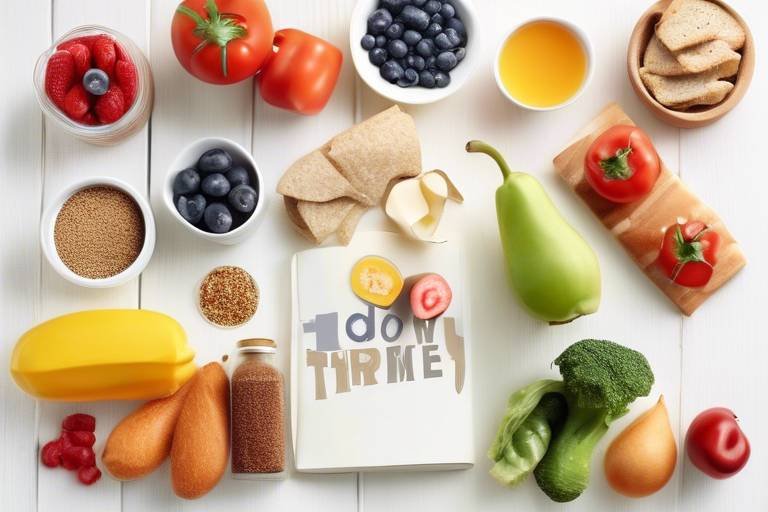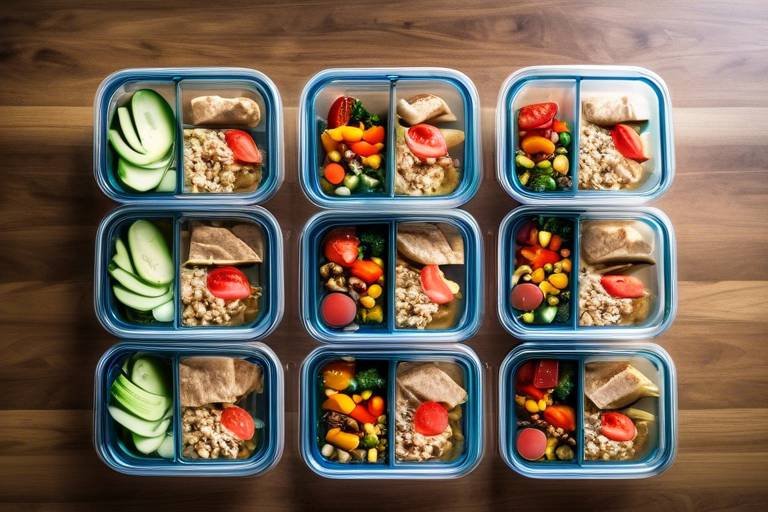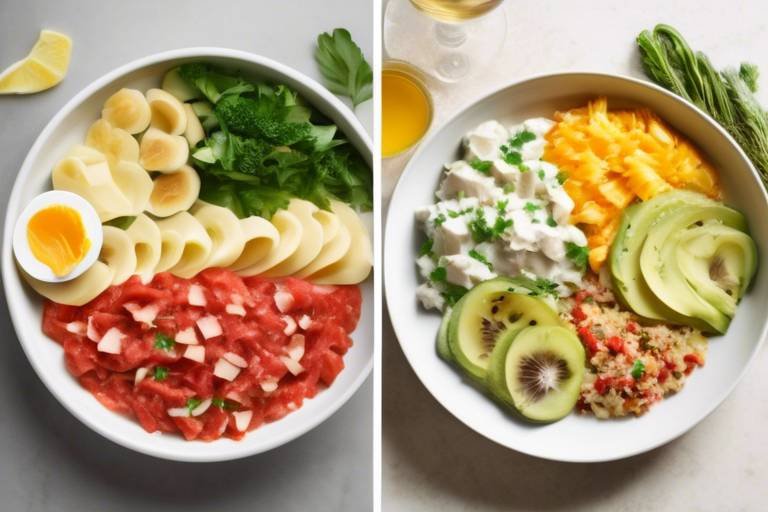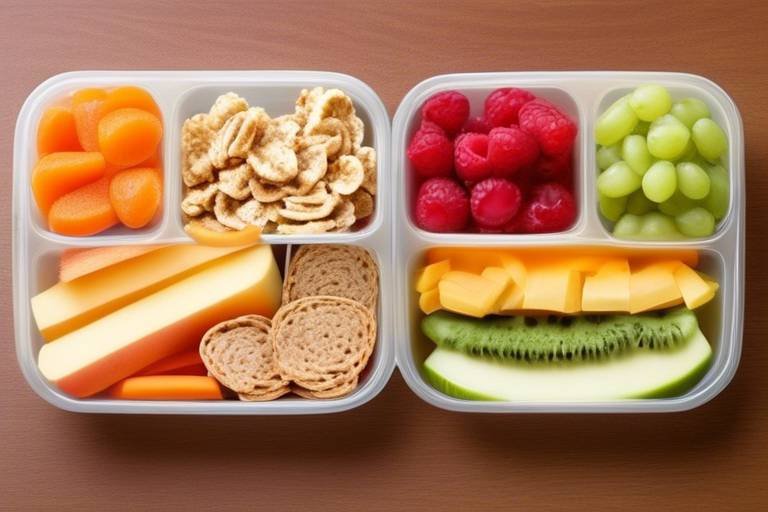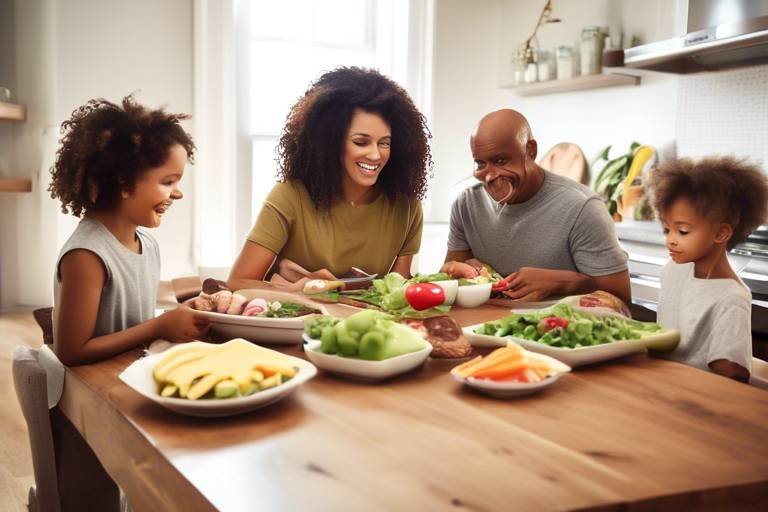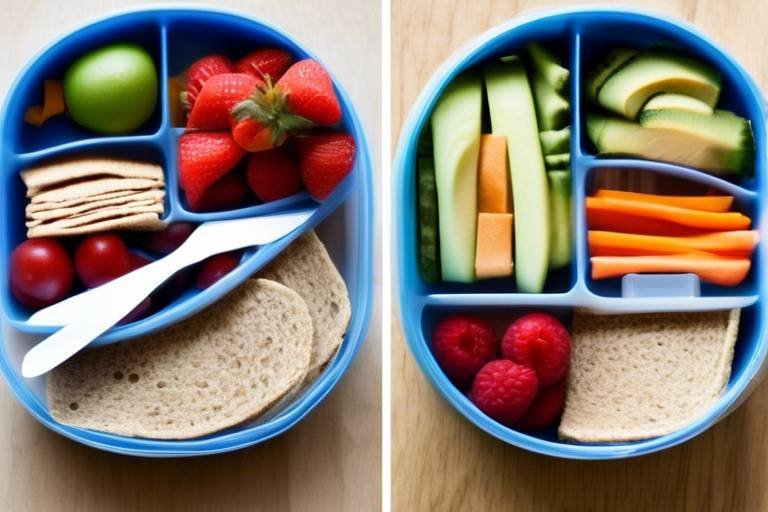The Benefits of Encouraging Kids to Cook
Have you ever noticed how kids are naturally curious? They love to explore, experiment, and discover new things. One of the most delightful ways to channel this curiosity is by encouraging them to cook! Involving children in the kitchen not only makes for some fun family moments but also offers a treasure trove of benefits that can shape their lives for the better. From enhancing essential life skills to fostering creativity and promoting healthy eating habits, cooking can be a game-changer for kids. Let's dive into the myriad advantages of getting your little ones involved in cooking!
Cooking is more than just mixing ingredients; it's a fantastic way for children to acquire essential life skills that will serve them well into adulthood. When kids cook, they learn to measure ingredients accurately, follow directions, and manage their time effectively. Imagine a child learning to bake cookies: they need to follow a recipe, measure flour and sugar, and keep an eye on the clock to avoid burning the batch. These skills—measuring, following instructions, and time management—are invaluable in everyday life. They translate into better academic performance and can even help with future job responsibilities. Plus, cooking encourages problem-solving. What happens if you run out of an ingredient? Kids learn to think on their feet and find alternatives, which is a skill that will benefit them in countless situations.
Cooking is an art, and kids are often the most imaginative artists of all! When you encourage them to experiment with different ingredients and flavors, you open the door to a world of creativity. Think of cooking as a blank canvas. Children can mix and match various ingredients to create their unique culinary masterpieces. This kind of creative expression is not just fun; it allows them to develop a personal style in the kitchen. For instance, they might decide to throw in some pineapple into a stir-fry, creating a surprising burst of flavor that delights everyone. This experimentation with flavors and textures can lead to a love for cooking that lasts a lifetime.
When kids take part in cooking, they're not just following recipes—they're embarking on a culinary adventure! This hands-on experience inspires them to explore different cuisines and cooking techniques. They might become curious about Italian pasta, spicy Indian curries, or even sushi-making. This exploration broadens their culinary horizons and fosters an appreciation for diverse cultures. Cooking becomes a gateway to understanding global traditions and flavors, making mealtime an exciting journey rather than just a routine.
As children learn about various ingredients, they also gain insight into nutrition and the importance of using fresh, healthy foods. Imagine a child picking fresh vegetables from the garden and then using them in a meal. This connection to their food helps them understand where it comes from and why it matters. They begin to recognize the difference between processed foods and wholesome ingredients, laying the foundation for a lifetime of healthy eating habits.
Experimenting with flavors encourages kids to develop their palates. They learn how to balance tastes—sweet, salty, sour, and bitter—enhancing their overall cooking experience. This understanding of flavor profiles can transform them into discerning eaters who appreciate the nuances of different dishes. It's like being a flavor detective, uncovering the secrets behind each bite!
There's something incredibly empowering about cooking. When children successfully prepare meals, they build self-esteem and confidence. Imagine a child proudly presenting a dish they've made themselves; the joy and pride on their face are priceless! This sense of accomplishment not only boosts their confidence in the kitchen but spills over into other areas of their lives. They learn that with practice and perseverance, they can achieve great things, whether it's flipping pancakes or tackling a challenging school project.
Involving kids in cooking is a fantastic way to encourage healthier eating habits. Research shows that children who help prepare meals are more likely to enjoy and try new foods. When they’ve had a hand in making a dish, they’re likely to be more excited about eating it. It's like a magic trick that turns mealtime into an adventure!
One of the most significant benefits of cooking together is that children are often more willing to try new vegetables. When they see how colorful and delicious a vegetable can be, it piques their interest. Suddenly, broccoli isn’t just a green blob on their plate; it’s a vibrant addition to their stir-fry masterpiece. This willingness to try new things can lead to a more balanced and nutritious diet, setting them up for a healthier future.
Cooking also teaches children the importance of meal planning. They learn to think ahead, consider what ingredients are needed, and make informed food choices. This skill is crucial for developing lifelong healthy habits. By understanding how to plan meals, kids can make better choices when it comes to nutrition, ensuring they fuel their bodies with the right foods.
- What age is appropriate to start cooking with kids? Generally, children can start helping in the kitchen as young as 2-3 years old, with simple tasks like washing vegetables.
- How can I make cooking more fun for my kids? Incorporate games, let them choose recipes, and encourage creativity in the kitchen.
- Are there any safety tips for cooking with children? Yes! Always supervise them, teach them about kitchen safety, and use age-appropriate tools.

Developing Life Skills
This article explores the various advantages of involving children in cooking, from enhancing their life skills to fostering creativity and promoting healthy eating habits.
Cooking is more than just a fun activity; it’s a gateway to developing essential life skills that children will carry with them into adulthood. When kids step into the kitchen, they embark on a journey filled with opportunities to learn and grow. For instance, measuring ingredients teaches them about precision and math skills. Have you ever tried to bake a cake without measuring the flour? It can turn into a sticky disaster! By learning to measure, children gain confidence in their ability to follow directions and understand the importance of accuracy.
Moreover, cooking requires time management. Kids learn to plan their tasks efficiently, figuring out what needs to be done first to ensure everything is ready at the same time. This skill translates well into their academic life—imagine them applying the same principles when juggling homework and extracurricular activities! With practice, they can become masters of multitasking, which is a valuable skill in today’s fast-paced world.
Additionally, cooking encourages problem-solving. What happens if you run out of sugar? Or if the recipe calls for an ingredient you don’t have? These situations prompt kids to think on their feet and come up with creative solutions. They learn to adapt and improvise, which are crucial skills in life. It's like being a chef in a restaurant where the unexpected can happen at any moment!
Furthermore, cooking can also teach children about responsibility. When they take charge of a meal, they learn to take ownership of their actions and the results. If they burn the toast or overcook the pasta, they understand that these outcomes are part of the learning process. This accountability helps instill a sense of pride and ownership in their work, making them more likely to try again and improve.
In conclusion, involving kids in cooking is not just about preparing a meal; it's about equipping them with crucial life skills. From measuring and time management to problem-solving and responsibility, the kitchen can serve as a vibrant classroom. So, the next time you’re in the kitchen, consider inviting your little ones to join you. They might just surprise you with their creativity and enthusiasm!
Encouraging kids to experiment with ingredients and flavors fosters creativity, allowing them to express themselves and develop their unique culinary style.
Kids who cook are more likely to explore different cuisines and cooking techniques, broadening their culinary horizons and appreciation for diverse cultures.
Learning about various ingredients helps children understand nutrition and the importance of using fresh, healthy foods in their meals.
Experimenting with flavors encourages kids to develop their palate and learn how to balance tastes, enhancing their overall cooking experience.
Cooking helps children build self-esteem as they successfully prepare meals, empowering them to take pride in their accomplishments.
Involving kids in cooking encourages healthier eating habits, as they are more likely to enjoy meals they have helped prepare.
Children who cook are often more willing to try new vegetables, leading to a more balanced and nutritious diet.
Cooking teaches children the importance of meal planning, helping them make informed food choices and develop lifelong healthy habits.
- Why should I involve my kids in cooking? Involving kids in cooking helps them develop essential life skills, boosts their creativity, and promotes healthier eating habits.
- At what age can children start cooking? Children can start helping in the kitchen as young as 2 or 3, with supervision and age-appropriate tasks.
- What are some simple recipes for kids? Simple recipes like smoothies, sandwiches, or scrambled eggs are great starting points for kids.
- How can cooking help with my child's education? Cooking involves math, science, and reading skills, making it a fun and practical way to enhance their learning.

Boosting Creativity
Cooking is not just about following recipes; it's a vibrant canvas where children can unleash their imagination and express themselves. When kids step into the kitchen, they are given the freedom to experiment with flavors and textures, turning mundane ingredients into culinary masterpieces. This hands-on experience promotes a sense of creativity that can be applied in all areas of life. Just think about it: when a child mixes unexpected ingredients, they’re not just making a meal; they’re exploring the art of taste, much like a painter mixing colors on a palette.
Encouraging children to play with their food can lead to some truly delightful discoveries. For instance, they might find that a pinch of cinnamon can elevate a simple apple dish or that a splash of lemon juice can brighten up a dull salad. These moments of exploration not only make cooking fun but also teach kids the value of trial and error. They learn that it’s okay to make mistakes, as each misstep can lead to a new flavor combination or a unique dish. This mindset fosters resilience and adaptability, essential traits for any budding chef.
Moreover, cooking together can become a collaborative art project. Imagine a scenario where kids are tasked with creating their own pizza. They can choose from a variety of toppings and sauces, allowing their personalities to shine through. This kind of creative freedom can lead to some interesting combinations—who knew pineapple and jalapeños could be a hit? Through these culinary adventures, kids are not only developing their taste buds but also learning how to think outside the box.
In addition to flavor experimentation, cooking can also encourage children to explore different cuisines and cultures. For instance, introducing them to the concept of fusion cuisine can be an exciting way to broaden their culinary horizons. They might blend Italian and Mexican dishes, creating a taco pizza that combines the best of both worlds. This exploration not only makes cooking more exciting but also instills an appreciation for diversity in food, teaching kids about global cultures through the universal language of cuisine.
To further enhance their creativity, parents can provide kids with a variety of ingredients and tools. A well-stocked pantry filled with spices, herbs, and fresh produce can inspire a child’s culinary imagination. Here are a few ways to encourage creative cooking:
- Set up a "mystery box" challenge where kids must create a dish using a selection of random ingredients.
- Encourage them to create their own recipes, perhaps starting with a basic framework and allowing them to add their twist.
- Host themed cooking nights where they can explore different cuisines and create dishes from around the world.
In conclusion, cooking is a fantastic way to boost creativity in children. It's a safe space where they can explore, experiment, and express themselves without fear of judgment. The skills they develop in the kitchen can translate to various aspects of their lives, helping them think critically and creatively as they grow. So, why not invite your little ones into the kitchen and see what culinary wonders they can create? You might just be surprised by their innovative spirit!

Inspiring Culinary Exploration
Cooking isn't just about throwing ingredients together; it's a gateway to a world of flavors, cultures, and experiences. When we encourage kids to step into the kitchen, we ignite their curiosity and inspire them to explore the vast culinary landscape. Imagine a young chef, apron on, eyes wide with wonder, as they mix spices from different corners of the globe. This is where culinary exploration begins!
By introducing children to various cuisines, we not only expand their taste buds but also their understanding of the world. For instance, a simple cooking session can turn into a fascinating journey through the vibrant markets of India, the rustic kitchens of Italy, or the bustling street food stalls of Thailand. Each dish has a story, and as kids learn to prepare these meals, they become part of that narrative. This connection to food fosters a deeper appreciation for different cultures and traditions.
Moreover, cooking encourages kids to experiment with ingredients and flavors. Just like an artist with a blank canvas, children can mix and match spices, herbs, and other components to create their own masterpieces. This experimentation can lead to delightful surprises—who knew that a pinch of cinnamon could elevate a savory dish or that a splash of lemon could brighten up a dessert? The kitchen becomes a playground for creativity where kids can discover their unique culinary style.
To further inspire this exploration, parents can introduce themed cooking nights. Imagine a Friday evening dedicated to Mexican cuisine, complete with tacos, guacamole, and churros. Not only do kids get to enjoy delicious food, but they also learn about the ingredients and cooking methods typical of that culture. This approach can be extended to various cuisines, making each cooking session an exciting adventure.
In summary, inspiring culinary exploration in children opens doors to creativity, cultural appreciation, and a lifelong love for cooking. It transforms the kitchen into a classroom where the lessons go beyond just recipes, teaching kids about the world around them. So, let’s hand them a spoon, and watch as they stir up their culinary dreams!
- Why is it important for kids to learn cooking skills?
Cooking skills help children develop independence, confidence, and an understanding of nutrition. - What age is appropriate to start cooking with kids?
Children can start cooking as young as 3 years old with simple tasks, gradually taking on more complex recipes as they grow. - How can I make cooking fun for my kids?
Incorporate games, themed nights, and allow them to choose recipes to make the experience enjoyable and engaging. - What are some easy recipes to start with?
Begin with simple recipes like smoothies, sandwiches, or pasta dishes that allow for creativity and minimal supervision.

Understanding Ingredients
Understanding ingredients is a crucial part of cooking that can significantly enhance a child's culinary journey. When kids learn about the various ingredients available to them, they not only become more skilled in the kitchen but also develop a deeper appreciation for the food they eat. This knowledge empowers them to make informed choices, fostering a healthier lifestyle. For instance, knowing the difference between whole grains and refined grains can help them understand why certain foods are better for their bodies.
Moreover, engaging children in discussions about the nutritional value of different ingredients can spark their curiosity and encourage them to experiment. For example, when they learn that broccoli is rich in vitamins and minerals, they might be more inclined to include it in their meals. This exploration can lead to a greater willingness to try new foods, as children become more aware of how different ingredients contribute to their overall health.
In addition, cooking with fresh, seasonal ingredients can be a fun way for children to connect with nature. When kids visit local farmers' markets or even grow their own herbs, they gain firsthand knowledge about where their food comes from. This not only adds an exciting element to cooking but also instills a sense of responsibility and respect for the environment.
To further illustrate the importance of understanding ingredients, consider the following table that outlines some common cooking ingredients and their benefits:
| Ingredient | Benefits |
|---|---|
| Spinach | Rich in iron and vitamins A, C, and K; promotes healthy bones and skin. |
| Quinoa | High in protein and fiber; a great alternative to rice. |
| Olive Oil | Contains healthy fats; beneficial for heart health. |
| Garlic | Boosts the immune system; has anti-inflammatory properties. |
By encouraging children to explore these ingredients, we are not just teaching them how to cook; we are equipping them with the knowledge to make healthier choices throughout their lives. As they begin to understand the role that different ingredients play in their meals, they will feel more confident in their cooking abilities and more excited about preparing delicious, nutritious meals for themselves and their families.
- Why is it important for kids to learn about ingredients? Understanding ingredients helps kids make healthier food choices and fosters a lifelong appreciation for nutritious eating.
- How can I involve my child in learning about ingredients? Take them grocery shopping, visit farmers' markets, or engage them in cooking discussions about the nutritional value of different foods.
- Are there specific ingredients that are better for kids? Incorporating a variety of fruits, vegetables, whole grains, and lean proteins is essential for a balanced diet for children.

Creating Flavor Profiles
This article explores the various advantages of involving children in cooking, from enhancing their life skills to fostering creativity and promoting healthy eating habits.
Cooking teaches children essential life skills such as measuring, following directions, and time management, which are valuable throughout their lives.
Encouraging kids to experiment with ingredients and flavors fosters creativity, allowing them to express themselves and develop their unique culinary style.
Kids who cook are more likely to explore different cuisines and cooking techniques, broadening their culinary horizons and appreciation for diverse cultures.
Learning about various ingredients helps children understand nutrition and the importance of using fresh, healthy foods in their meals.
When children step into the kitchen, they embark on a flavorful adventure that goes beyond just mixing ingredients. is akin to painting a masterpiece; it requires understanding the basic elements and how they interact to create something truly delicious. Kids can learn to identify different tastes—sweet, salty, sour, bitter, and umami. By experimenting with various combinations, they can discover how these flavors can either complement or contrast with each other.
For instance, a simple dish like roasted vegetables can become a canvas for creativity. By adding a splash of balsamic vinegar, a sprinkle of herbs, or even a dash of spices, children can transform ordinary vegetables into a culinary delight. This process not only enhances their cooking skills but also teaches them to appreciate the complexity of flavors. They begin to understand that cooking is not just about following recipes but about creating experiences that delight the senses.
Moreover, kids can keep a flavor journal where they jot down their experiments with different ingredients. This can include:
- Ingredients used
- Flavor combinations tried
- Their personal rating of the dish
- Suggestions for future improvements
Through this fun exercise, they not only track their progress but also develop a critical palate that encourages them to be adventurous eaters. They learn that cooking is a journey, and each dish is an opportunity to explore new tastes and textures.
Cooking helps children build self-esteem as they successfully prepare meals, empowering them to take pride in their accomplishments.
Involving kids in cooking encourages healthier eating habits, as they are more likely to enjoy meals they have helped prepare.
Children who cook are often more willing to try new vegetables, leading to a more balanced and nutritious diet.
Cooking teaches children the importance of meal planning, helping them make informed food choices and develop lifelong healthy habits.
It's never too early to start! Depending on their age, children can help with simple tasks like washing vegetables or stirring ingredients. As they grow, you can introduce more complex tasks.
Try to incorporate games, like a cooking challenge or a themed dinner night. Allow them to choose recipes that interest them, and encourage creativity in the kitchen.
Absolutely! Always supervise young children, teach them about kitchen safety, and ensure they use age-appropriate tools. Start with non-sharp utensils and gradually introduce them to knives as they gain more confidence.

Building Confidence
This article explores the various advantages of involving children in cooking, from enhancing their life skills to fostering creativity and promoting healthy eating habits.
Cooking teaches children essential life skills such as measuring, following directions, and time management, which are valuable throughout their lives.
Encouraging kids to experiment with ingredients and flavors fosters creativity, allowing them to express themselves and develop their unique culinary style.
Kids who cook are more likely to explore different cuisines and cooking techniques, broadening their culinary horizons and appreciation for diverse cultures.
Learning about various ingredients helps children understand nutrition and the importance of using fresh, healthy foods in their meals.
Experimenting with flavors encourages kids to develop their palate and learn how to balance tastes, enhancing their overall cooking experience.
Cooking is not just about mixing ingredients; it’s a powerful way for children to build confidence. When kids step into the kitchen, they embark on a journey filled with opportunities to learn and grow. Each time they successfully prepare a dish, they gain a sense of accomplishment that boosts their self-esteem. Imagine the joy on their faces when they present a meal they created from scratch! This feeling of pride can be transformative.
Moreover, cooking allows children to make decisions and solve problems. For instance, if a recipe doesn’t turn out as expected, they learn to troubleshoot and adjust their approach. This process of trial and error is essential because it teaches them that mistakes are a part of learning. Just like in life, not everything goes perfectly, and cooking provides a safe space for them to navigate those challenges.
Involving kids in cooking can also foster a sense of responsibility. When they take ownership of a meal, they learn to appreciate the effort that goes into preparing food. This connection between effort and reward can lead to greater confidence in their abilities. For example, when a child prepares dinner for the family, they not only gain cooking skills but also experience the joy of contributing to family life.
To further illustrate this, consider the following table that highlights how different cooking experiences can enhance a child’s confidence:
| Cooking Experience | Confidence Boost |
|---|---|
| Following a Recipe | Gains a sense of achievement when the dish turns out well. |
| Experimenting with Flavors | Encourages risk-taking and creativity. |
| Cooking for Family | Builds pride and responsibility. |
| Hosting a Meal | Enhances social skills and boosts self-esteem. |
Ultimately, cooking is a delightful way for kids to learn about themselves and their capabilities. As they chop, stir, and taste, they are not just making meals; they are crafting confidence that will serve them well beyond the kitchen.
Involving kids in cooking encourages healthier eating habits, as they are more likely to enjoy meals they have helped prepare.
Children who cook are often more willing to try new vegetables, leading to a more balanced and nutritious diet.
Cooking teaches children the importance of meal planning, helping them make informed food choices and develop lifelong healthy habits.
- Why is it important for kids to learn to cook? Learning to cook equips children with essential life skills, promotes healthy eating, and boosts their confidence.
- At what age can children start cooking? Children can start helping in the kitchen as young as 3-4 years old, with supervision and age-appropriate tasks.
- How can I encourage my child to cook more? Involve them in meal planning, let them choose recipes, and make cooking a fun family activity.
- What are some easy recipes for kids? Simple recipes like scrambled eggs, smoothies, or homemade pizzas are great starting points.
- How does cooking help with math skills? Cooking involves measuring ingredients, which helps children practice math in a practical context.

Promoting Healthy Eating
Involving kids in the kitchen is not just about having fun; it plays a crucial role in promoting healthy eating habits. When children participate in cooking, they develop a more profound appreciation for the food they consume. Imagine a child who has spent time chopping vegetables, stirring sauces, and seasoning dishes. This experience transforms them from passive eaters into active participants in their nutrition journey. When kids help prepare meals, they are much more likely to enjoy what they eat, leading to a healthier relationship with food.
Moreover, cooking together provides an excellent opportunity to discuss the importance of nutrition. Parents can explain the benefits of various ingredients, helping children understand why certain foods are better choices than others. For instance, when preparing a colorful salad, you could highlight the nutritional benefits of each vegetable. This not only educates them but also encourages them to be curious about what goes into their meals.
One of the most significant benefits of cooking with kids is that it encourages them to try new foods, especially vegetables. Many children are notoriously picky eaters, but when they have a hand in the cooking process, they are often more willing to taste what they've helped to create. This can lead to a more balanced and nutritious diet. Here’s a fun fact: kids who cook are more likely to eat a variety of vegetables, which can significantly improve their overall health.
Furthermore, cooking teaches kids the value of meal planning. When they help decide what to make for dinner, they learn how to think ahead and consider what ingredients are needed. This skill is invaluable as they grow older and begin to make their own food choices. Understanding how to plan meals not only sets the foundation for a healthy lifestyle but also fosters independence. They learn to make informed decisions about what they eat, which can lead to lifelong healthy habits.
To illustrate, here’s a simple table that shows how cooking can change children's attitudes towards food:
| Activity | Impact on Eating Habits |
|---|---|
| Preparing a Meal | Increases willingness to try new foods |
| Learning About Ingredients | Enhances understanding of nutrition |
| Meal Planning | Promotes healthier choices |
| Cooking with Family | Strengthens family bonds and encourages communication about food |
In conclusion, cooking with children is a fantastic way to promote healthy eating habits. It turns mealtime into a fun and educational experience, leading to better food choices and a more balanced diet. So, the next time you're in the kitchen, invite your little ones to join you. You might be surprised at how much they learn and how their tastes evolve!
- Why is cooking with kids important? Cooking with kids helps them develop essential life skills, promotes healthy eating habits, and fosters creativity.
- What age is appropriate to start cooking with children? Children as young as 2 can help with simple tasks, while older kids can handle more complex recipes.
- How can I encourage my child to try new foods? Involve them in the cooking process and allow them to choose ingredients, making it more likely they'll want to try what they helped create.

Encouraging Vegetable Consumption
When kids take part in the cooking process, they often develop a greater appreciation for the food they prepare, especially vegetables. Have you ever noticed how a child is more likely to try a new dish if they had a hand in making it? By involving children in cooking, we open the door to a world of flavors and textures that they might typically shy away from. This hands-on experience can transform their perception of vegetables from mere side dishes to exciting ingredients waiting to be explored.
One of the most effective ways to encourage vegetable consumption is through creativity in the kitchen. For instance, try introducing a rainbow theme during meal prep. You could challenge your kids to include vegetables of every color in their dishes. This not only makes the cooking process fun but also teaches them about the nutritional benefits associated with different colored vegetables. Here’s a quick look at some colorful options:
| Color | Vegetable Examples | Nutritional Benefits |
|---|---|---|
| Red | Tomatoes, Red Bell Peppers | Rich in antioxidants, particularly lycopene. |
| Green | Spinach, Broccoli | High in vitamins A, C, and K, and iron. |
| Orange | Carrots, Sweet Potatoes | Loaded with beta-carotene, which is great for vision. |
| Purple | Aubergine, Purple Cabbage | Contains anthocyanins, known for their anti-inflammatory properties. |
In addition to making the cooking process interactive and visually appealing, it's essential to talk to kids about the health benefits of eating vegetables. You can explain how certain vegetables help them grow strong, keep their skin clear, and even boost their mood. This knowledge can empower them to make better food choices independently. For example, you might say, “Did you know that eating carrots can help you see better in the dark?” This kind of information can pique their interest and encourage them to experiment with different vegetable dishes.
Moreover, involving children in the selection of vegetables at the grocery store can be a game-changer. Let them pick out a new vegetable to try each week. This not only gives them a sense of ownership but also makes them more invested in the cooking process. When they choose their ingredients, they are more likely to be excited about cooking and, ultimately, eating those vegetables.
It's also worth mentioning that the way vegetables are prepared can significantly impact a child's willingness to eat them. Roasting vegetables, for instance, can bring out their natural sweetness, making them more appealing. You could even turn the cooking process into a fun experiment by trying different cooking methods—steaming, grilling, or sautéing—and discussing which methods they prefer. This experimentation can lead to delightful discoveries, like a child who suddenly loves Brussels sprouts when they’re roasted with a sprinkle of olive oil and a dash of salt.
In summary, encouraging vegetable consumption in children is not just about getting them to eat their greens; it's about making the entire experience enjoyable and educational. By involving them in cooking, allowing them to explore different flavors, and empowering them with knowledge, we can help cultivate a lifelong love for vegetables. After all, when children feel connected to their food, they're more likely to make healthier choices now and in the future.
- How can I get my child interested in cooking? Start with simple recipes that allow them to get hands-on experience. Choose fun themes or involve them in selecting ingredients.
- What if my child refuses to eat vegetables? Encourage them to try different cooking methods and involve them in the preparation process to make vegetables more appealing.
- Are there specific vegetables that are better for kids? Yes, vegetables like carrots, sweet potatoes, and spinach are nutritious and generally well-received by children.

Understanding Meal Planning
Meal planning is like creating a roadmap for your family's dietary needs, and when kids get involved, it transforms the process into a fun and educational adventure. By teaching children how to plan meals, you’re not just handing them the reins to the kitchen; you’re equipping them with the tools to make informed food choices throughout their lives. Imagine your child confidently selecting ingredients at the grocery store, understanding why they’re choosing whole grains over processed foods. It's a skill that will serve them well into adulthood!
One of the first steps in meal planning is understanding the nutritional value of different foods. When kids learn about the food pyramid or the MyPlate model, they can visualize how to balance their plates with fruits, vegetables, proteins, and grains. This knowledge is crucial because it encourages them to think critically about what goes into their meals. You might say, "Why not make it a game?" Challenge them to create a meal that includes at least three different colors of vegetables or to incorporate a new fruit they've never tried before. This way, meal planning becomes a creative exercise rather than just a chore.
Moreover, involving kids in meal planning can also help them develop a sense of responsibility. When they participate in deciding what the family eats, they learn the importance of making healthy choices. They can even create a simple meal plan for the week, which could look something like this:
| Day | Breakfast | Lunch | Dinner |
|---|---|---|---|
| Monday | Oatmeal with fruits | Turkey sandwich | Grilled chicken with veggies |
| Tuesday | Smoothie bowl | Quinoa salad | Spaghetti with tomato sauce |
| Wednesday | Pancakes with maple syrup | Vegetable wrap | Stir-fried tofu with rice |
As they create their meal plans, encourage them to think about the budget as well. This teaches them not only about nutrition but also about financial literacy. They'll learn how to shop smart by comparing prices, looking for sales, and understanding the value of buying in bulk. It’s a life skill that will pay dividends in the future!
Finally, meal planning can foster family bonding. When kids help decide what to eat, they’re more likely to be excited about the meals and eager to help cook them. You can turn it into a family affair by having a weekly “meal planning night,” where everyone shares their ideas and preferences. This not only makes meals more enjoyable but also strengthens family ties and creates lasting memories.
In conclusion, understanding meal planning isn’t just about filling the fridge; it’s about teaching kids the importance of healthy eating, budgeting, and family involvement. So, why not start today? Get your kids involved in meal planning and watch them flourish into confident, health-conscious individuals!
- What age should I start involving my kids in cooking? It's never too early! Kids as young as 3 can help with simple tasks, while older kids can take on more complex responsibilities.
- How can I make cooking fun for my kids? Turn it into a game! Challenge them to create a dish with specific ingredients or let them pick a theme for the meal.
- What if my child is a picky eater? Involve them in the cooking process! Kids are often more willing to try new foods when they’ve had a hand in making them.
Frequently Asked Questions
- Why should I encourage my kids to cook?
Encouraging your kids to cook helps them develop essential life skills, boosts their creativity, and promotes healthy eating habits. It's a fun way for them to learn responsibility and gain confidence in the kitchen.
- What life skills do children learn from cooking?
Cooking teaches children a variety of life skills such as measuring ingredients, following recipes, time management, and even basic math skills. These skills are not only useful in the kitchen but also in everyday life.
- How can cooking boost my child's creativity?
When kids are involved in cooking, they get to experiment with different ingredients and flavors. This freedom allows them to express themselves and develop their unique culinary style, making cooking a creative outlet.
- What are the nutritional benefits of kids cooking?
Involving kids in cooking encourages them to understand nutrition better. They are more likely to try new vegetables and make healthier food choices when they have a hand in preparing the meals.
- How does cooking help with meal planning?
Cooking teaches children the importance of planning meals, which helps them learn to make informed food choices. This skill can lead to healthier eating habits that last a lifetime.
- Can cooking really build my child's confidence?
Absolutely! Successfully preparing meals gives children a sense of accomplishment. As they master new recipes and techniques, their self-esteem grows, empowering them to take pride in their cooking skills.
- What age is appropriate for kids to start cooking?
Kids can start cooking as early as 2 or 3 years old with simple tasks like washing vegetables or stirring ingredients. As they grow older, you can introduce more complex tasks based on their maturity and skill level.
- How can I make cooking fun for my kids?
Make cooking a fun family activity! Play music, let them choose recipes, or even have themed cooking nights. The more enjoyable the experience, the more likely they are to want to participate.





